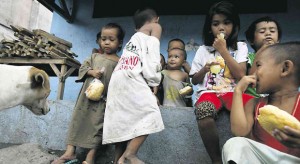SWS: Hungry Filipino families surge to 4.8M
MANILA, Philippines–Some 4.8 million Filipino families said they experienced hunger in September, about 1.2 million families more than the previous quarter as hunger rose in all areas except in Mindanao, according to the latest Social Weather Stations (SWS) report.
The survey, conducted from Sept. 26 to 29 and released last Monday, found 22 percent of the respondents saying they experienced involuntary hunger at least once in the past three months, 5.7 points higher than the 16.3 percent, or an estimated 3.6 million families in June.
The September hunger figure was the worst in a year and was 2.5 points above last year’s annual average of 19.5 percent. A record high of 23.8 percent was seen in March 2012.
The same SWS survey found 55 percent, or 12.1 million families, saying they consider themselves poor in September, unchanged from June, while 43 percent, or 9.3 million families, said they consider themselves food-poor, slightly up from 41 percent, or 9 million families, in the previous quarter.
Ernesto M. Pernia, professor emeritus of economics at the University of the Philippines and a former lead economist of the Asian Development Bank, cited the likely causes of the uptick as such underlying factors as persisting poverty and worsening inequality.
He also said that the higher prices of basic goods and services, including transportation, healthcare and education, which compete with food requirements, could be a proximate factor, noting that real incomes (inflation-adjusted purchasing power) are buying less.
Upticks seasonal
“It’s possible that even the poor have changing tastes and preferences in food and other basic needs (e.g. cell phone load needs). Further it’s possible that hunger upticks are seasonal, e.g. if/when births are concentrated in certain months,” Pernia said in an e-mail interview.
SWS asked 1,200 respondents in Filipino: “In the last three months, did it happen even once that your family experienced hunger and did not have anything to eat?” Those who answered in the affirmative were further asked: “Did it happen ‘only once,’ ‘a few times,’ ‘often’ or ‘always?’”
SWS classified experiencing hunger “only once” or “a few times” as “moderate hunger,” while going hungry “often” or “always” was rated as “severe hunger.”
Those who said they experienced “moderate hunger” increased from 13.5 percent (3 million families) in June to 17.6 percent (3.8 million families) in September, the worst since August 2012 when “moderate hunger” was 18 percent. Those who said they experienced severe hunger also rose from 2.8 percent (609,000 families) in June to 4.4 percent (970,000 families) in September, the highest since 5.4 percent in June last year.
The rise in overall hunger between June and September could be attributed to the increasing hunger among those who considered themselves poor (from 21.1 percent to 31.4 percent), food-poor (from 27 percent to 36.6 percent) and non-food-poor (8.8 percent to 11.2 percent), according to SWS, even as hunger among nonpoor barely changed from 10.3 percent to 10.4 percent.
By geographic areas, hunger jumped in Metro Manila from 15.3 percent in June to 22 percent in September, the highest so far this year but still below the 23.5 percent average last year.
In Luzon outside Metro Manila, hunger climbed by 9.6 points to 24.3 percent, the highest since the 26-percent rate recorded in June last year. It is also above the 18.3-percent average in the rest of Luzon last year.
Likewise, hunger in the Visayas, at 18.7 percent, was the worst since the 21 percent seen there in June last year. The average hunger in the area last year was 16.1 percent.
It was only in Mindanao where hunger went down, from 21.3 percent in June to 20.3 percent in September. The Mindanao figure was also lower than the 22.1 percent annual average in 2013.
Meanwhile, Social Welfare Secretary Corazon Soliman refused to acknowledge that the government’s flagship conditional cash transfer (CCT) program for the poor may not be working in the face of the worsening hunger incidence in the country, as shown in the latest SWS survey.
Soliman insisted the survey results did not indicate that the CCT, also known as the Pantawid Pamilyang Pilipino, is not working.
“In fact, without our programs, the survey may have yielded more detrimental results,” she claimed, adding that the Department of Social Welfare and Development (DSWD) will have to “intensify our programs to ensure that the number will not increase anymore.”
Soliman said solving hunger and poverty takes a long time.
“We cannot quickly eradicate poverty and hunger. Survey results like those of the SWS are good reference points. They should not prevent us in addressing our people’s needs,” she said in a statement.–Ana Roa, Inquirer Research and Dona Z. Pazzibugan
RELATED STORIES
12M families say they are poor in latest SWS report















